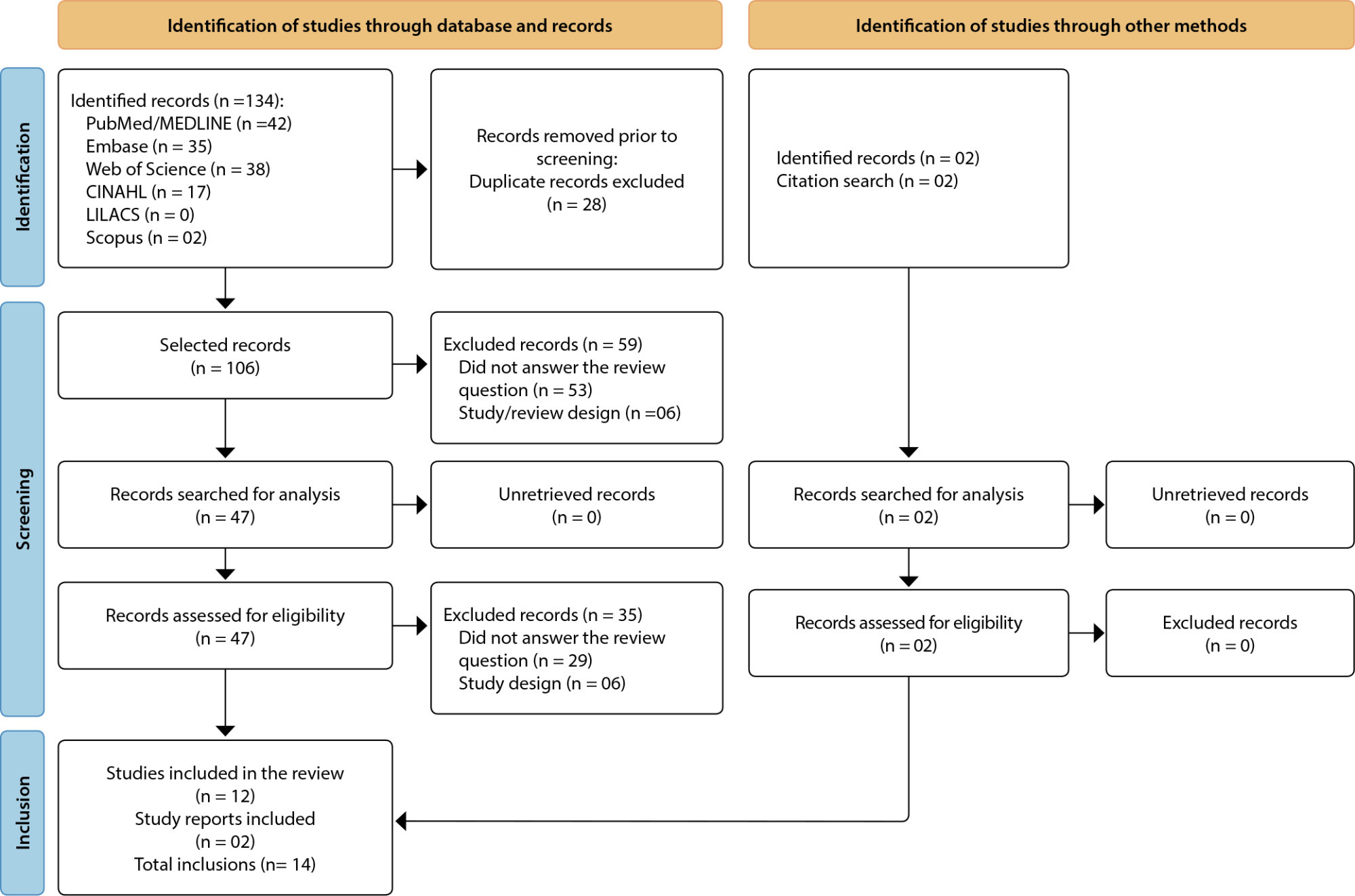-
ORIGINAL ARTICLE12-04-2023
Effect of cardiovascular biofeedback on nursing staff stress: a randomized controlled clinical trial
Revista Brasileira de Enfermagem. 2023;76(6):e20230069
Abstract
ORIGINAL ARTICLEEffect of cardiovascular biofeedback on nursing staff stress: a randomized controlled clinical trial
Revista Brasileira de Enfermagem. 2023;76(6):e20230069
DOI 10.1590/0034-7167-2023-0069
Views0See moreABSTRACT
Objective:
to assess the effect of cardiovascular biofeedback on nursing staff stress when compared to an activity without self-monitoring.
Method:
a randomized controlled clinical trial, carried out with nursing professionals from a university hospital. The intervention group (n=58) performed cardiovascular biofeedback, and the control (n=57) performed an online puzzle without self-monitoring, totaling nine meetings over three weeks. The outcome was assessed using the Stress Symptoms and Work-Related Stress scales, and the biological marker heart rate variability. The generalized estimating equations method was used.
Results:
the intervention had no effect on self-reported instruments (p>0.050). However, there was an effect of time (p<0.050) on all heart rate variability indicators, demonstrating changes over the sessions.
Conclusion:
cardiovascular biofeedback showed promising results in the biological marker, suggesting that it can be used in nursing staff as a complementary therapy by promoting better autonomic nervous system regulation.

-
Transition of Care for Individuals with Mental Disorders in Brazil: A Contextual Analysis
Revista Brasileira de Enfermagem. 2023;76(6):e20230063
Abstract
Transition of Care for Individuals with Mental Disorders in Brazil: A Contextual Analysis
Revista Brasileira de Enfermagem. 2023;76(6):e20230063
DOI 10.1590/0034-7167-2023-0063
Views0See moreABSTRACT
Objective:
To describe the contexts of care transition for individuals with mental disorders in the Brazilian setting.
Methods:
A contextual analysis was conducted through a scoping review. The search for studies was conducted in databases and thesis and dissertation portals, and the analysis was based on immediate, specific, general, and meta-contexts.
Results:
The sample, consisting of eight studies, indicated that the following factors are present in the contexts where care transition occurs: Peculiarities of care transition for individuals with mental disorders; Perspectives that can strengthen or weaken this transition; Approaches proposed in the past for the development of care transition; and Elements related to Brazilian legislation.
Final Considerations:
It is observed that the transition of care for individuals with mental disorders in Brazil takes place in various contexts of care levels. These variations present significant potentials and barriers in the care scenarios.
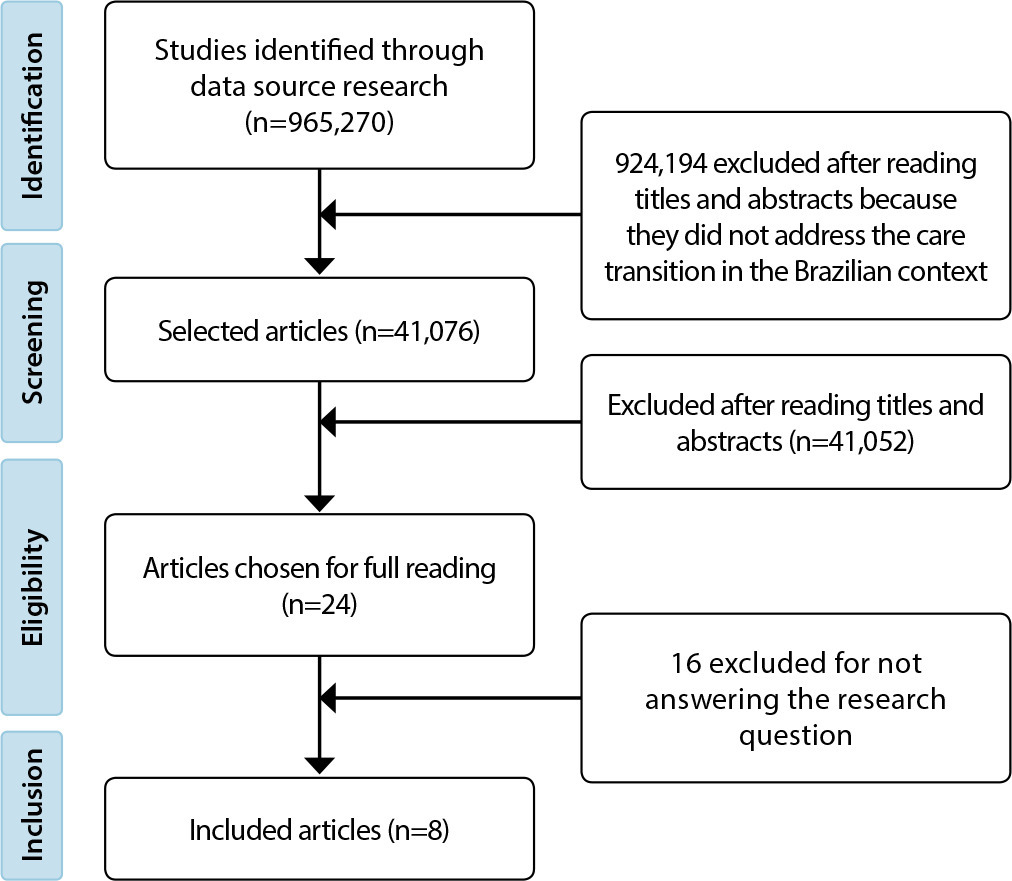
-
ORIGINAL ARTICLE12-04-2023
Sexual behavior according to undergraduate students: perspective of cross-cultural nursing and intersectional framing
Revista Brasileira de Enfermagem. 2023;76(6):e20220786
Abstract
ORIGINAL ARTICLESexual behavior according to undergraduate students: perspective of cross-cultural nursing and intersectional framing
Revista Brasileira de Enfermagem. 2023;76(6):e20220786
DOI 10.1590/0034-7167-2022-0786
Views0ABSTRACT
Objective:
to discuss undergraduate students’ sexual behavior from the perspective of social markers and cross-cultural care proposed by Madeleine Leininger.
Methods:
descriptive-exploratory qualitative research, with a theoretical-philosophical foundation in the Transcultural Theory. Convenience sample was composed of 57 young people from two universities in Rio de Janeiro. The focus groups’ content were analyzed lexically using the IRAMUTEQ software.
Results:
four classes emerged: Young people’s sexual scripts: between the fear of an unplanned pregnancy and the risk of exposure to sexually transmitted infections; Affective relationships: trust in steady sexual partners, apparent sense of security and disuse of condoms; Sexual practices, gender and cultural determinants: distinction in men’s and women’s role; Sexual partnerships, negotiation of condom use and vulnerability to sexually transmitted infections.
Final considerations:
challenges are perceived for the attention to undergraduate students’ sexual health, who verbalized risky sexual behaviors due to sociocultural vulnerabilities.
Keywords:Cross-Cultural NursingIntersectional FramingSexual BehaviorSexually Transmitted InfectionsYoung AdultSee more
-
Sleep quality of nurses who worked in coping with COVID-19: an integrative review
Revista Brasileira de Enfermagem. 2023;76(6):e20230007
Abstract
Sleep quality of nurses who worked in coping with COVID-19: an integrative review
Revista Brasileira de Enfermagem. 2023;76(6):e20230007
DOI 10.1590/0034-7167-2023-0007
Views0See moreABSTRACT
Objective:
to analyze sleep quality of nurses who worked coping with COVID-19 in scientific evidence.
Methods:
an integrative review, carried out in seven databases, including studies between December 2021 and June 2022, without language restrictions. The sample consisted of 15 primary studies.
Results:
nurses working in hospital, intensive care, outpatient care and teaching institutions constitute a vulnerable group for sleep disorders: latency, duration, efficiency and quality. The disorders identified involved insomnia at varying levels of severity: daytime dysfunction and morning sleepiness. Night work and low capacity for self-care were determinants of impaired sleep patterns.
Final considerations:
the COVID-19 pandemic contributed to greater vulnerability of nurses to changes in sleep, requiring strategies for risk management and well-being promotion.

-
ORIGINAL ARTICLE12-04-2023
Work and Mental Distress among Nurses in the Amazon Region of Brazil during the COVID-19 Pandemic
Revista Brasileira de Enfermagem. 2023;76(6):e20220792
Abstract
ORIGINAL ARTICLEWork and Mental Distress among Nurses in the Amazon Region of Brazil during the COVID-19 Pandemic
Revista Brasileira de Enfermagem. 2023;76(6):e20220792
DOI 10.1590/0034-7167-2022-0792
Views0See moreABSTRACT
Objective:
To assess the relationship between psychopathological symptoms and the social, clinical, and occupational profile of nurses in the Amazon region of Brazil during the COVID-19 pandemic.
Methods:
A descriptive cross-sectional online study was conducted in 2020 with 261 nurses. The Symptom Assessment Scale-40 was utilized.
Results:
The presence of pre-existing conditions before the pandemic was associated with psychotism (p=0.044). Experiencing constraints and/or violence at work during the pandemic was associated with somatization (p=0.025), and working hours were associated with anxiety (p=0.025). Nurses predominantly exhibited symptoms related to fear (33.7%), tension (34.5%), and a sense that something is wrong in the mind (22.6%).
Conclusions:
A significant association was observed between working hours and anxiety symptoms, the experience of constraints and/or violence at work during the COVID-19 pandemic and somatization symptoms, as well as between pre-existing conditions and psychotism symptoms related to COVID-19.
-
Simulation training of caregivers at hospital discharge of patients with chronic diseases: an integrative review
Revista Brasileira de Enfermagem. 2023;76(6):e20230043
Abstract
Simulation training of caregivers at hospital discharge of patients with chronic diseases: an integrative review
Revista Brasileira de Enfermagem. 2023;76(6):e20230043
DOI 10.1590/0034-7167-2023-0043
Views0See moreABSTRACT
Objective:
to identify evidence about the use and effects of clinical simulation for preparing caregivers for discharging patients with chronic conditions.
Methods:
an integrative peer review in the Scopus, PubMed, Web of Science, Cumulative Index to Nursing and Allied Health Literature, ScienceDirect and Virtual Health Library databases, from July to September 2022.
Results:
3,218 studies were identified, with a final sample consisting of four national and two international articles. Using simulation as an educational technology contributed to caregiver preparation in home care. In most studies, using clinical simulation included using other strategies to complement training: expository dialogued class, conversation circle and audiovisual resources.
Final considerations:
simulation proved to be efficient for training caregivers, with the active participation of family members and nurses in health education actions.
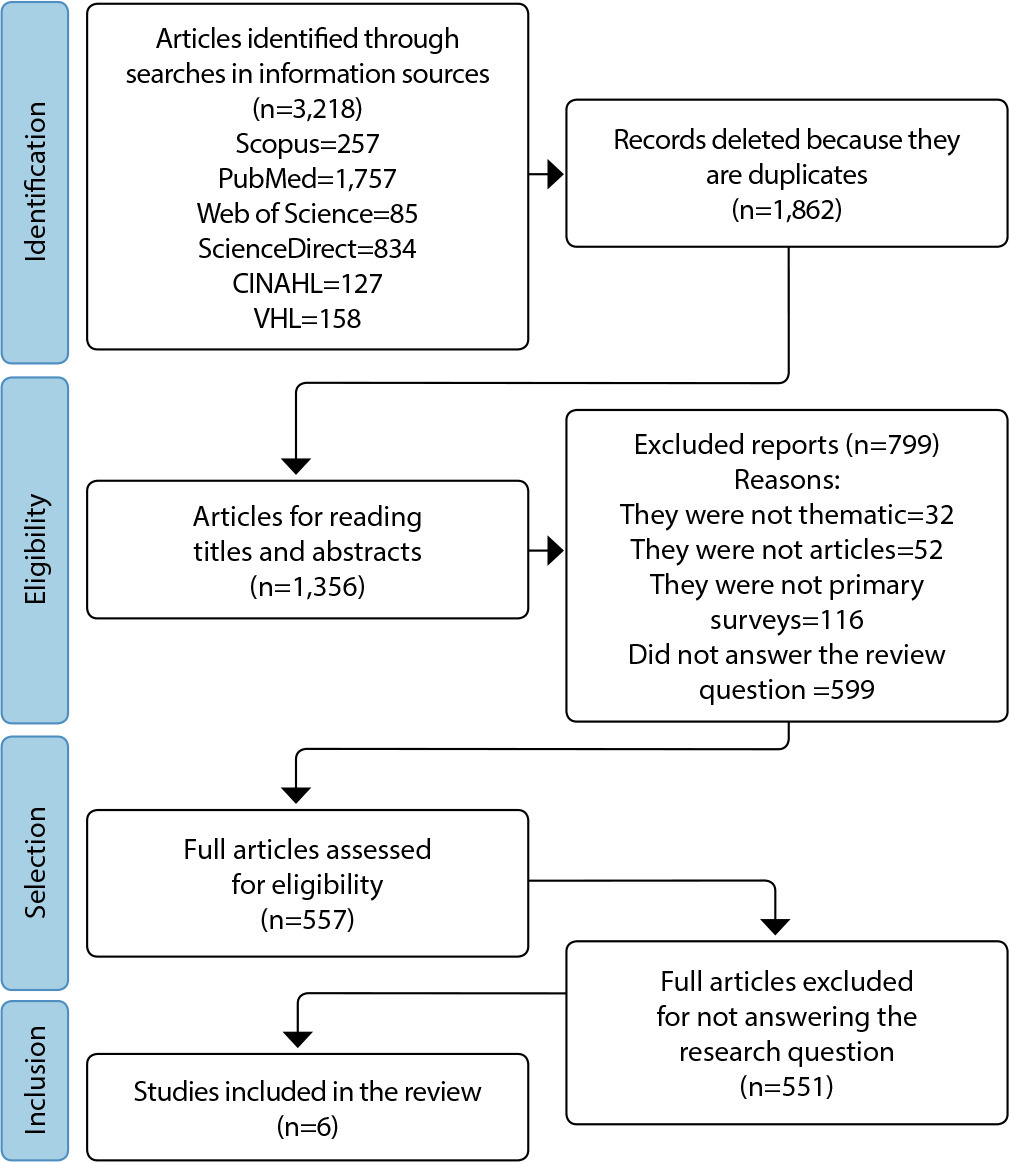
-
ORIGINAL ARTICLE12-04-2023
Feelings about birth by a group of high-risk pregnant women
Revista Brasileira de Enfermagem. 2023;76(6):e20230059
Abstract
ORIGINAL ARTICLEFeelings about birth by a group of high-risk pregnant women
Revista Brasileira de Enfermagem. 2023;76(6):e20230059
DOI 10.1590/0034-7167-2023-0059
Views0See moreABSTRACT
Objective:
to understand feelings about birth among a group of high-risk pregnant women.
Method:
a descriptive and qualitative study, using Alfred Schütz’s social phenomenology as a philosophical theoretical framework. The study included 25 pregnant women undergoing high-risk prenatal care. The interview had the following guiding questions: tell me about your feelings regarding the moment of birth/childbirth; How do you deal with the high-risk diagnosis? What are your expectations for birth/childbirth?
Results:
five categories emerged: Fear of obstetric care; Fear of complications with the baby; Fear of cesarean section; Resilience in the face of high-risk pregnancy; and Expectations for birth.
Considerations:
high-risk pregnant women are afraid of the care they will receive, the risks and concern about the baby’s vitality at birth. The importance of care is emphasized, with a welcoming environment, bonding and communication between health team and pregnant woman.
-
ORIGINAL ARTICLE03-09-2020
Quality of life at work in a central sterile processing department
Revista Brasileira de Enfermagem. 2020;73(2):e20180792
Abstract
ORIGINAL ARTICLEQuality of life at work in a central sterile processing department
Revista Brasileira de Enfermagem. 2020;73(2):e20180792
DOI 10.1590/0034-7167-2018-0792
Views1See moreABSTRACT
Objectives:
to evaluate the quality of life of nursing professionals who work in a central sterile processing department.
Methods:
a descriptive, quantitative, exploratory study, conducted with 82 nursing professionals working in the Central Sterile Processing Department of a University Hospital, from September to November 2017. A semi-structured instrument and the questionnaire “Medical Outcomes Study Short-Form 36” were used. Results: most of the participants were female, married, aged 31-40 years; 47.6% with 6-10 years of profession, and 82.9% reported working in CSPD for 1-5 years. The most affected quality of life domains were Pain, Vitality, General Health Status and Social Aspects.
Conclusions:
This study showed a need for rethinking and re-creating the labor dynamics in CSPD to improve the quality of life of these nursing professionals.
-
ORIGINAL ARTICLE07-06-2020
Nurses’ work process in an emergency hospital service
Revista Brasileira de Enfermagem. 2020;73(5):e20180923
Abstract
ORIGINAL ARTICLENurses’ work process in an emergency hospital service
Revista Brasileira de Enfermagem. 2020;73(5):e20180923
DOI 10.1590/0034-7167-2018-0923
Views1ABSTRACT
Objectives:
to analyze the nurses’ work process in an Emergency Hospital Service.
Methods:
a qualitative, exploratory and descriptive research conducted with 17 nurses from the emergency service of a high complexity hospital in southern Brazil. Data were collected through interviews, focus group and document analysis. Data analysis followed the thematic content analysis framework.
Results:
four categories emerged: Work environment characteristics; Assistance dimension; Management dimension; Care management.
Final Considerations:
the nurses’ work process in Emergency Hospital Service is characterized by the peculiarities of the setting, with centrality in care and care management aiming at quality care and safety to patients.
Keywords:Emergency NursingEmergency Service, HospitalHealth ManagementNurse's RoleProfessional PracticeSee more -
REVIEW07-13-2020
The quality of life of family health professionals: a systematic review and meta-synthesis
Revista Brasileira de Enfermagem. 2020;73(5):e20190645
Abstract
REVIEWThe quality of life of family health professionals: a systematic review and meta-synthesis
Revista Brasileira de Enfermagem. 2020;73(5):e20190645
DOI 10.1590/0034-7167-2019-0645
Views1See moreABSTRACT
Objectives:
to perform a systematic review and meta-synthesis of qualitative studies about the work-related quality of life of Family Health Strategy professionals.
Methods:
this systematic review was developed to answer the following PVO question: “Which factors (variables) are associated with the work-related quality of life (outcome) of Family Health Strategy professionals (population)?” The PubMed, Scopus, Embase, SciELO, Web of Science, LILACS, Science Direct, OpenThesis, OpenGrey, and OATD databases were selected. The meta-synthesis analyzed the main codes and secondary codes of all included studies.
Results:
the database search resulted in 1,744 reports; six were considered eligible for the meta-synthesis. Four factors were considered for the quality of work life: working conditions; work processes; interpersonal relationships; and personal aspects.
Conclusions:
although this study confirms the adequacy of aspects commonly related to the quality of work life, other factors are important in the case of FHS professionals, especially work context.

-
REVIEW11-06-2020
Transitional care to caregivers of dependent older people: an integrative literature review
Revista Brasileira de Enfermagem. 2020;73:e20200394
Abstract
REVIEWTransitional care to caregivers of dependent older people: an integrative literature review
Revista Brasileira de Enfermagem. 2020;73:e20200394
DOI 10.1590/0034-7167-2020-0394
Views1See moreABSTRACT
Objective:
To identify the needs of caregivers of dependent older people related to self-care in the transition from hospital to home.
Methods:
Integrative literature review that followed a predefined protocol, carried out from March to May 2019 in the platforms EBSCO, B-On, Scopus, Web of Science, and Joanna Briggs Institute. Descriptors and eligibility criteria were defined for the bibliographic sample, which was ten articles. The search was limited to articles published between 2015 and 2019 to guarantee evidence topicality.
Results:
The needs of caregivers related to transitional care can be grouped into five categories: needs in the transition into the role of caregiver; needs related to self-care of caregivers themselves; health needs; economic needs; and social and collective needs.
Final considerations:
The work developed by nurses regarding transitional care of caregivers must have two focuses: managing care provided to dependent older people and managing the needs of caregivers and the care offered to them.

-
REVIEW09-21-2020
Middle range theory for the nursing diagnosis Excess Fluid Volume in pregnant women
Revista Brasileira de Enfermagem. 2020;73:e20190334
Abstract
REVIEWMiddle range theory for the nursing diagnosis Excess Fluid Volume in pregnant women
Revista Brasileira de Enfermagem. 2020;73:e20190334
DOI 10.1590/0034-7167-2019-0334
Views1See moreABSTRACT
Objective:
To stablish a middle range theory for the understanding of the causal mechanisms and clinical consequentes of the nursing diagnosis Excess Fluid Volume (00026) among pregnant women.
Method:
The Middle Range Theory was constructed in five stages: defining of construction approach, establishing main concepts, elaborating propositions, developing a pictorial diagram, and establishing the causal relationships and evidence for practice of the Middle Range Theory.
Results:
We identified 14 clinical indicators and 6 causal factors of Excess Fluid Volume. A pictorial diagram was developed and relationships between Excess Fluid Volume elements were established with 6 propositions for them.
Conclusion:
The Middle Range Theory included both physiological and pathological conditions to explain Excess Fluid Volume. This Middle Range Theory might help in the better understanding of interactions between causal factors and clinical indicators of Excess Fluid Volume.
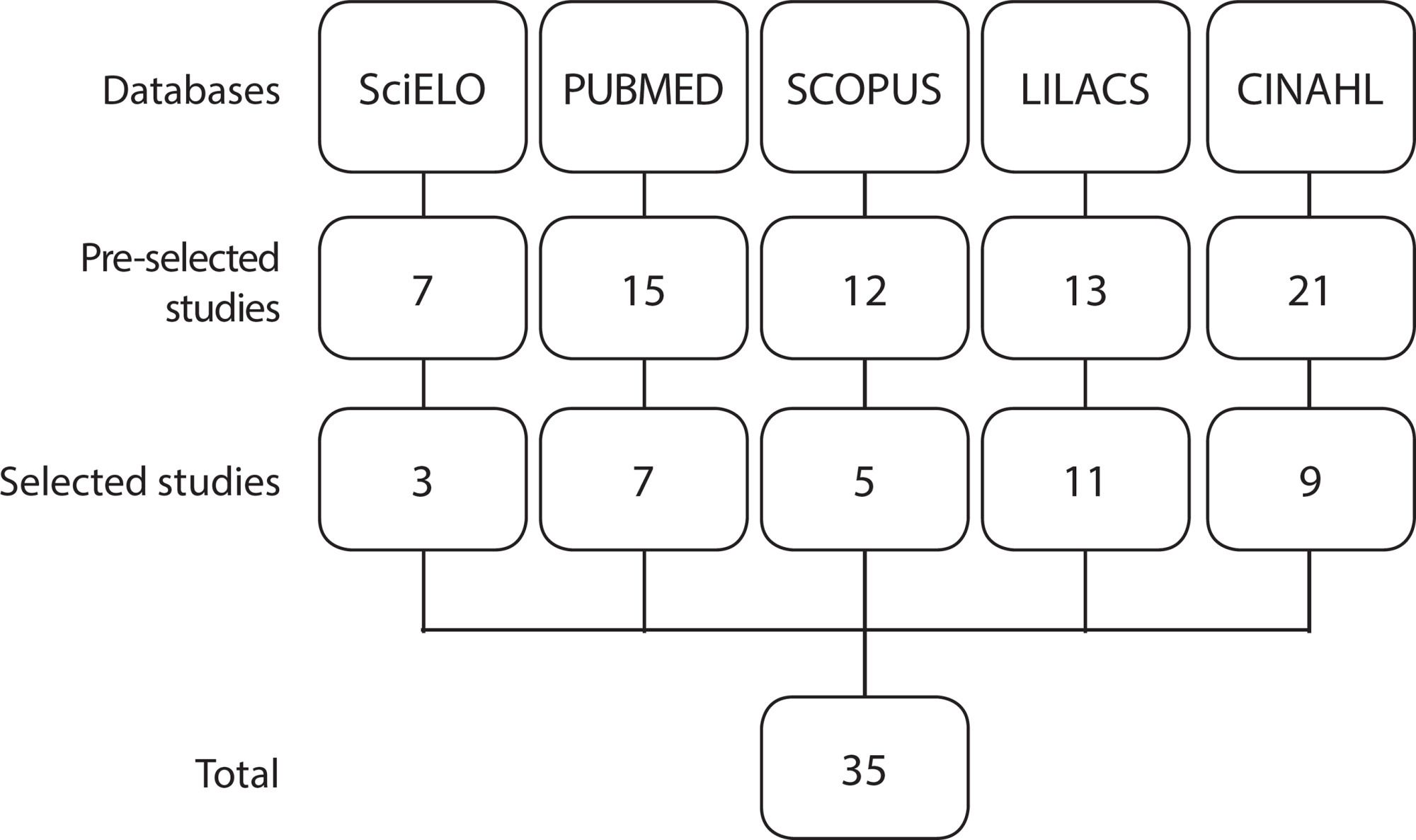
-
Real and illusory perceptions of patients in induced coma
Revista Brasileira de Enfermagem. 2019;72(3):818-824
Abstract
Real and illusory perceptions of patients in induced coma
Revista Brasileira de Enfermagem. 2019;72(3):818-824
DOI 10.1590/0034-7167-2017-0906
Views1See moreABSTRACT
Objective:
To identify, in the scientific literature, real and illusory perceptions of adult patients in induced coma.
Methods:
This is an integrative review of 15 primary studies from the Medline, Web of Science, LILACS, CINAHL and SCOPUS databases.
Results:
The main memories reported after induced coma were thirst, cold, and pain. In some studies, patients reported they were unable to tell whether they were awake or dreaming, whether it was real or unreal. Satisfactory memories were reported by patients related to the care received and the use of bedside journals.
Conclusion:
Evidence showed a number of studies aiming to identify delirium, but without a focus on analyzing real or illusory perceptions of patients after induced coma. Thus, this integrative review identified scientific evidence of memories related to perceptions of sedated patients in the intensive care unit.
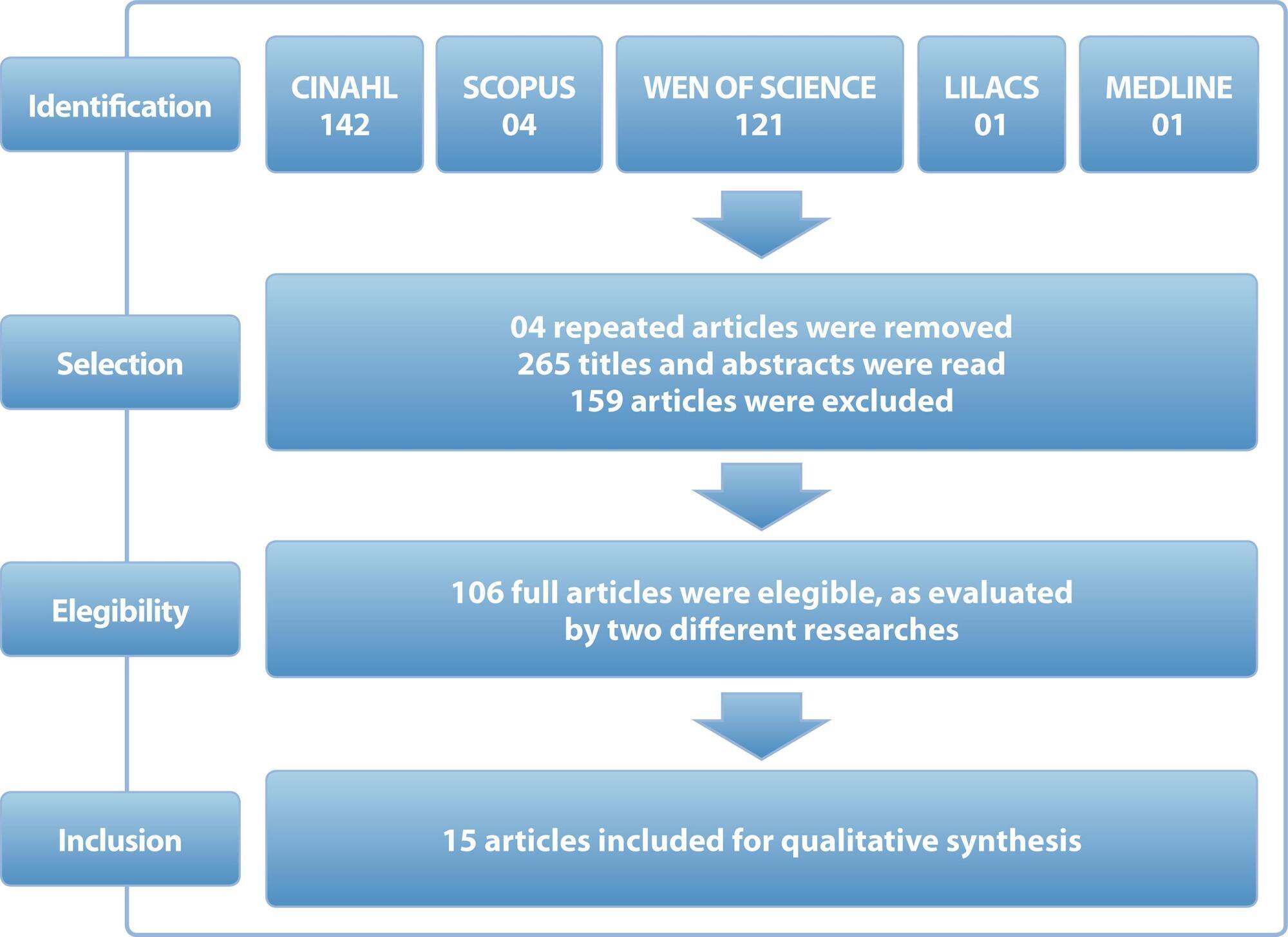
-
REVIEW12-21-2020
Communication between pre-hospital and intra-hospital emergency medical services: literature review
Revista Brasileira de Enfermagem. 2020;73:e20190817
Abstract
REVIEWCommunication between pre-hospital and intra-hospital emergency medical services: literature review
Revista Brasileira de Enfermagem. 2020;73:e20190817
DOI 10.1590/0034-7167-2019-0817
Views1ABSTRACT
Objectives:
to analyze, according to the scientific literature, communication strategies in the transfer of cases between pre-hospital and in-hospital services and their contributions to patient safety.
Methods:
this is a literature review study, that is, one that aims to gather and synthesize research results on the subject in a systematic and orderly manner.
Results:
ten articles were published, published between 2010 and 2018, and two points of discussion emerged: use of mnemonics; and barriers to transferring a case.
Conclusions:
studies point to the need to standardize the case transfer process, as well as integrative training of professionals, regular assessment of the teams involved in emergency medical services and the need for research on the subject.
Keywords:AmbulanceCommunicationEmergency Medical ServicesReviewTransfer of Responsibility by the PatientSee more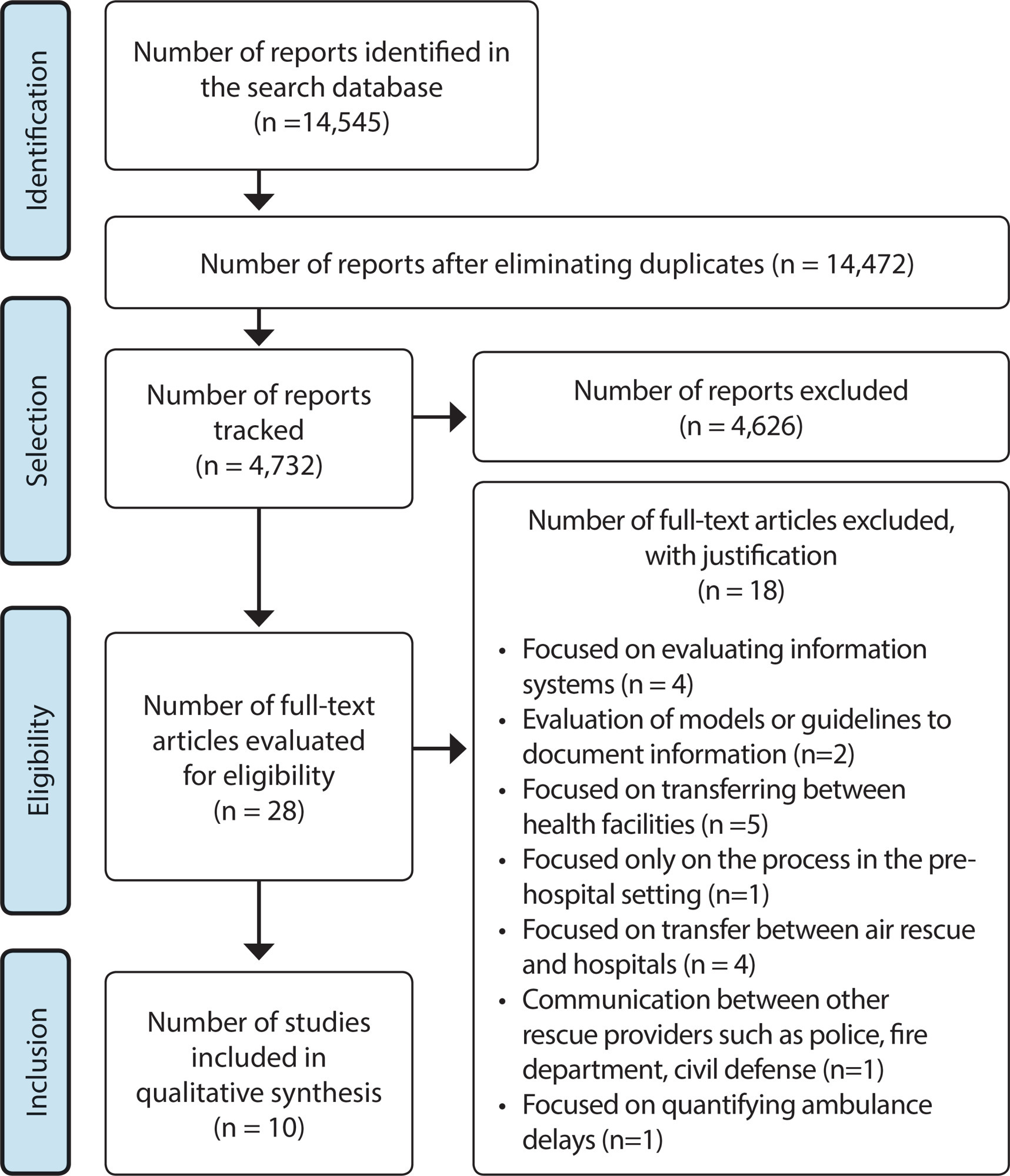
-
ORIGINAL ARTICLE03-24-2021
Health promotion actions in the School Health Program in Ceará: nursing contributions
Revista Brasileira de Enfermagem. 2021;74(1):e20190769
Abstract
ORIGINAL ARTICLEHealth promotion actions in the School Health Program in Ceará: nursing contributions
Revista Brasileira de Enfermagem. 2021;74(1):e20190769
DOI 10.1590/0034-7167-2019-0769
Views1See moreABSTRACT
Objectives:
to compare health promotion actions carried out by Family Health teams in Ceará, linked to the School Health Program.
Methods:
a cross-sectional study involving the first and second cycles of an external assessment of 910 and 1,626 teams from 184 municipalities, which joined the Brazilian National Program for Improvement of Access and Quality of Primary Care. Eight clinical assessment and seven health promotion indicators were assessed, together with health professionals working in schools.
Results:
the interviewees were nurses (95.6% and 98.3%). Between the cycles, there was an increase in clinical assessment (78.7% and 91.3%), health promotion and disease prevention (82.5% and 89.3%) and survey of students for follow-up (41.4% and 66.4%) in schools.
Conclusions:
health actions at school advanced between cycles, with nurses as protagonists in school health, which can reduce vulnerabilities in children and adolescents and qualify Primary Care.
Search
Search in:
Nuvem de Tags
Aged (144) Atenção Primária à Saúde (239) COVID-19 (104) Cuidados de Enfermagem (269) Educação em Enfermagem (151) Educação em Saúde (139) Enfermagem (930) Estudos de Validação (131) Health Education (144) Idoso (208) Mental Health (149) Nursing (987) Nursing Care (306) Patient Safety (151) Primary Health Care (284) Qualidade de Vida (104) Quality of Life (106) Saúde Mental (145) Segurança do Paciente (150) Validation Studies (108)




